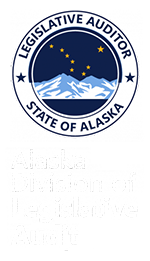| SUMMARY OF: | A Special Report on the Department of Community and Economic Development, Division of Investments, Commercial Fishing Revolving Loan Fund, March 18, 2003. |
Purpose of the Report
In accordance with Title 24 of the Alaska Statutes and a special request by the Legislative Budget and Audit Committee, we conducted a performance and financial audit of the Commercial Fishing Revolving Loan Fund (CFRLF). Our specific objectives were to:
- Perform an audit of the fund’s financial statements
- Evaluate administration of the loan fund and related loan program for compliance with Alaska Statutes and regulations.
- Ascertain the effect that Division of Investments (DOI) lending and collecting practices have on the financial position of the loan fund.
- Determine whether DOI is competing with private or public lenders when making commercial fishing loans and whether such competition is in accordance with the purpose of the program.
Report Conclusions
We have audited the FY 02 financial statements of CFRLF and concluded that, in our opinion, the statements were free of material misstatement. The statements, notes, and the accompanying auditor opinions are included in this report.
Generally, we concluded the financial position of the CFRLF has declined due to its loan concentration in the troubled salmon fishing industry. In spite of the large number of borrowers that are not making their CFRLF principal and interest payments, the CFRLF continues to receive more cash than it loans to fishermen resulting in positive cash flow into the fund.
DOI is charged with accomplishing two competing and sometimes opposing public policy goals: managing the state’s financial investment in the commercial fishery and assisting Alaska residents that do not qualify for alternate financing to enter or remain in the fishery. DOI has acted within its legal authority when responding to the salmon disasters, however, in the long-term their actions may not meet the intent of the program. DOI’s temporary policies are at risk of becoming standards of operation to the detriment of the fund’s financial position. DOI’s actions have far-reaching, economic implications that warrant input and direction from both the legislature and the governor.
In general, we found DOI administers the commercial fishing loan program in compliance with statutes and regulations. However, we have noted instances where loan practices could be improved. We have also noted that DOI collection practices are limited by the agency’s failure to report CFRLF debt-to-credit reporting agencies. Further, due to its loan practices, the state has become the preferred lender for most types of commercial fishing loans.
CFRLF lending patterns have changed significantly over the past 11 years. Quota share loans and refinancing vessel loans, originally financed with other financial institutions, have become increasingly important while the demand for permit loans has substantially decreased. Refinancing of other lenders’ vessel loans has increased the default risk borne by the state.
The value of limited entry permits, which serve as the primary collateral of the CFRLF, has declined significantly. The decrease in value has several implications. In the event of a default, DOI’s ability to mitigate losses declines, collection efforts are hampered, and DOI’s inventory of repossessed permits will grow significantly. This may lead to the further devaluation of permits as DOI repossessed permits are “promptly” put up for sale as required by statute.
To help limit the State’s exposure to loss due to default, DOI has accepted the assignment of Exxon Valdez Oil Spill (EVOS) settlements. In the event EVOS settlements are approved by the courts, DOI is slated to receive $8.3 million to be applied to CFRLF borrowers’ indebtness.
Findings and Recommendations
- We recommend the commissioner of the Department of Community and Economic Development coordinate with the governor’s office to ensure that the CFRLF policy’s and regulations remain consistent with overall public policy goals.
- We recommend the director of DOI reevaluate the benefits provided by the pay-on-time program in light of the substantial administrative inefficiencies of the program.
- We recommend the director of DOI takes steps necessary to ensure EVOS assignments are not accepted when alternative collateral is available.
- The director of DOI should change its current policy to ensure EVOS settlements are applied to interest first.
- We recommend the director of DOI coordinate with other state agencies when replacing the current loan subsystem.
- The director of DOI should change several loan serving policies to improve administration of the program.
- The director of DOI should ensure that the availability of other financing is thoroughly documented and considered during the loan application process.

